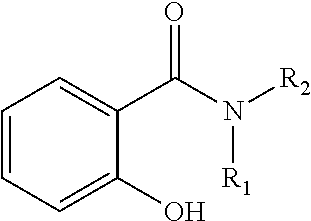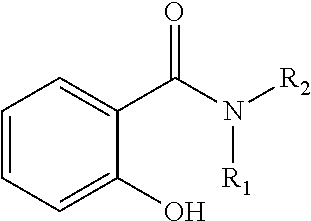Oral Care Compositions
- Summary
- Abstract
- Description
- Claims
- Application Information
AI Technical Summary
Benefits of technology
Problems solved by technology
Method used
Image
Examples
example 1
e Formulation
[0113]Representative Dentifrice Formulations according to the present disclosure are prepared according to Table 1 below:
TABLE 1IngredientWeight %WaterQ.S.Humectants15-60(e.g. 45)Abrasives10-30(e.g. 20)Thickeners0.5-5(e.g. 3.6)Organic Acid Buffer Salt (e.g., Trisodium0.0-3.0(e.g. 1)Citrate)Zinc Phosphate (e.g., zinc phosphate0.05-5(e.g. 1)monohydrate)Flavor, Sweetener, Colors0.5-5(e.g. 0.65)Alkali Phosphate Salts0.5-5(e.g. 2)Anionic Surfactant0.01-10(e.g. 1.50)Zwitterionic Surfactant0.1-4.5(e.g. 1.25)Organic Acid Buffer Acid (e.g. Citric Acid)0.0-3.0(e.g. 0.2)Stannous Fluoride0.5-11(e.g. 0.454)
[0114]Experimental dentifrice compositions are prepared as shown in Table 2. Each dentifrice comprises 0.454% stannous fluoride and 2.35% zinc phosphate hydrate, but varies in the concentration of citric acid and trisodium citrate dihydrate present. Ingredients in Table 1 are listed by weight of the composition.
TABLE 2Example AExample BIngredientWeight %Weight %WaterQ.S.Q.S.Sorbit...
example 2
and Zinc Uptake
[0115]The Compositions of Example A and 13 are compared in a bovine metal ion uptake assay. Metal ion uptake is measured using the ESCA technique (X-ray photoelectron spectroscopy). Bovine enamel specimens are used to prepare 3 mm wide disks of bovine enamel in which all but the exposed enamel surface is protected with acrylic resin. Each enamel sample is etched with 1M perchloric acid solution, and then rinsed. 2 mL of fresh human saliva is then added, and the samples are incubated at 37° C. for 2 hours in order to cause pellicle formation. After removing the saliva and rinsing, the samples are treated with 2 ml, of a 1:2 slurry of test composition in distilled water for 2 minutes at 37° C. with shaking. One sample is treated with water as a negative control to determine baseline metal ion content. After rinsing the samples with water, they are submitted to ESCA analysis. The baseline metal ion levels measured in the negative control are subtracted from the other tes...
example 3
[0117]Anti-bacterial efficacy is measured using an ATP bioluminescence assay with saliva-derived bacteria (BacTiter-Glo Microbial Cell Viability Assay, from Promega). Assays are performed at both a 1:4 dilution and a 1:8 dilution of the dentifrice in phosphate-buffered saline. Compositions A and B are compared to a commercial toothpaste composition comprising sodium fluoride with no antibacterial agents (Comp. Ex. I) and to a commercial toothpaste composition comprising stannous fluoride and zinc lactate (Comp. Ex. II) Results are determined by sample luminescence on a PerkinElmer 2104 EriVision Multilabel Reader. Luminescence is measured in units of cps (counts per second). The results are shown in Table 4 below.
TABLE 4Sample DilutionTest Comp.1:41:8Comparative Ex. I2.36 × 1052.12 × 105Comparative Ex. II4.07 × 1046.74 × 104Composition A3.37 × 1038.66 × 103Composition B6.35 × 1031.25 × 104
[0118]The results show that each of the Composition A, containing zinc ph...
PUM
| Property | Measurement | Unit |
|---|---|---|
| Percent by mass | aaaaa | aaaaa |
| Percent by mass | aaaaa | aaaaa |
| Percent by mass | aaaaa | aaaaa |
Abstract
Description
Claims
Application Information
 Login to View More
Login to View More - R&D
- Intellectual Property
- Life Sciences
- Materials
- Tech Scout
- Unparalleled Data Quality
- Higher Quality Content
- 60% Fewer Hallucinations
Browse by: Latest US Patents, China's latest patents, Technical Efficacy Thesaurus, Application Domain, Technology Topic, Popular Technical Reports.
© 2025 PatSnap. All rights reserved.Legal|Privacy policy|Modern Slavery Act Transparency Statement|Sitemap|About US| Contact US: help@patsnap.com


